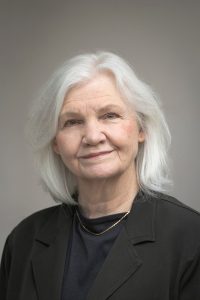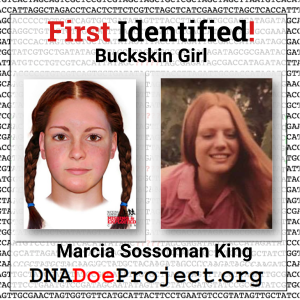You know those cold cases where families are left with unanswered questions and profound, unresolved grief? Well, the techniques developed and deployed by DNA Doe Project (DDP), Investigative Genetic Genealogy (IGG) have been a game-changer for those cases – and we owe a huge debt to some seriously amazing women, including DDP co-founder Margaret Press.
The power of “what if?”
Around 2016, a handful of genetic genealogists who had been helping with unknown parentage cases, heir searching, and other genetic genealogy puzzles, each arrived at the same “a-ha moment” question: “What if these techniques could be applied to law enforcement cold cases?”

DDP Co-Founder Margaret Press
But, this group wasn’t like other cold case investigators – they were retired scientists, attorneys, TV producers, PhDs, and grandmothers. And, they were all women.
They knocked on doors, pitched proposals to law enforcement agencies, and intentionally took on some of the oldest and coldest of cases. And it worked. Cases that could never have been solved otherwise were now cleared, and families had answers at last.
 The resounding success of these trailblazing women launched an entirely new field of investigative techniques. On April 11, 2018, DNA Doe Project announced the identification of Marcia Sossoman, formerly known as Buckskin Girl. When the identification of the Golden State Killer, Joseph DeAngelo, was announced later the same month, the world took notice.
The resounding success of these trailblazing women launched an entirely new field of investigative techniques. On April 11, 2018, DNA Doe Project announced the identification of Marcia Sossoman, formerly known as Buckskin Girl. When the identification of the Golden State Killer, Joseph DeAngelo, was announced later the same month, the world took notice.
Eight years on, the success of IGG has spawned a proliferation of labs offering whole genome sequencing, a process that produces a DNA profile that can be formatted like a direct-to-consumer DNA profile. The unknown profile can then be compared to profiles uploaded by the general public, using tools on GEDmatch Pro, FamilyTreeDNA, and DNA Justice. This comparison analyzes DNA segments in common between profiles to see if two people are related, and if so, how closely. From there, traditional genealogy is used to build family trees to determine the identity of the unknown person.
Margaret Press has been a driving force in the use of IGG to identify Jane and John Does, but she didn’t stop there. She is also a founding board member of the Investigative Genetic Genealogy Accreditation Board, which has developed standards and ethics for the emerging field, and recently launched its accreditation testing program to ensure IGG practitioners have the competencies needed for this complex work.
In 2021, she also co-founded DNAJustice.org, a non-profit DNA database purpose-built for law enforcement cases. Uploads to DNAJustice are free for the public, and for law enforcement, reducing the cost of the IGG process for budget-strapped agencies.
The founding mothers of IGG sparked a revolution in cold case investigation that has now resolved thousands of cold cases across the US. These techniques have the power to identify Jane and John Doe unidentified remains and bring answers to families of missing persons after years or decades.
